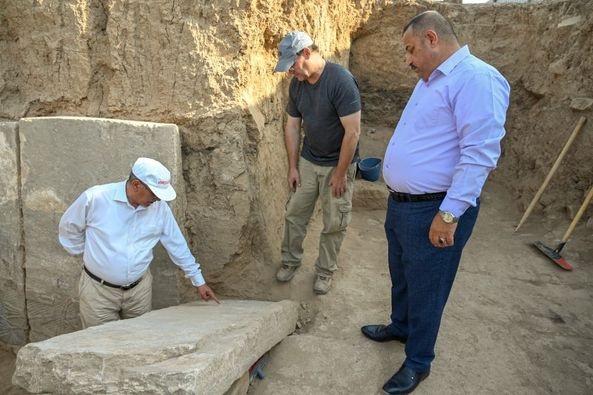Iraqi-American excavation mission discovers 8 mural carvings in Mosul

Members of the joint Iraqi-American excavation mission at Mashki Gate in Mosul after they discovered Assyrian mural carvings.
Baghdad (IraqiNews.com) – The joint Iraqi-American excavation mission in its second season at the Mashki Gate in Mosul, the capital city of Nineveh governorate, discovered Assyrian mural carvings containing war scenes, according to the director of the State Board of Antiquities and Heritage (SBAH), Laith Majid Hussein.
By reading the cuneiform writings on these mural carvings, it was found that they belong to King Sennacherib 705-681 BC, according to Hussein.
Director of the Department of Investigation and Excavations, Ali Obaid Shalgham, explained that work is ongoing to pave the way for the maintenance of the foundations and walls of the Mashka Gate to bring it to how it was before it was bulldozed by ISIS terrorists in 2016.
Shalgham indicated that the discovery consisted of eight slabs of marble (alabaster) with engraved scenes of Assyrian soldiers in addition to palm trees, grape trees, pomegranate trees and fig trees belonging to the palace of King Sennacherib.
The Assyrian King Sin-shar-ishkun moved the marble slabs to the gate and vandalized them to hide its features as they belonged to King Sennacherib who was the grandfather of his father, Shalgham explained.
An American mission from the University of Pennsylvania will carry out the maintenance work for these mural carvings, Shalgham added.
The Mashki Gate in Mosul was one of the monumental gates of Nineveh, the oldest and the most populous city of the Assyrian empire, an imperial capital, and a major crossroads between the eastern Mediterranean and the Iranian plateau, according to international alliance for the protection of heritage in conflict areas (Aliph Foundation).
The site has been excavated by international teams, and the artifacts are now located in museums around the world. Reconstructed in the 1970s, the Mashki Gate was an iconic part of Mosul’s skyline and a symbol of the city’s long history, Aliph Foundation mentioned.
The Mashki Gate was the only part of the site that was fully excavated and reconstructed by the Iraqi team. Because it was a symbol of Iraq’s long history, it was destroyed in 2016 by ISIS terrorists, Aliph Foundation added.
